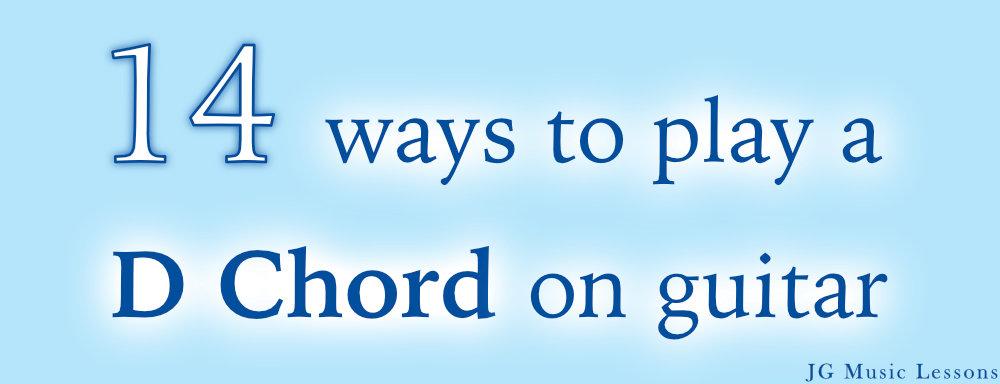The D Major chord is one of the first chords you should know on guitar. Although this chord has an easy open shape, there are many different ways you can play it throughout the fretboard.
By knowing the different chord variations, you’ll have more flexibility to play it throughout the fretboard whenever needed.
We’ll first go over some basic chord theory and then cover 14 ways to play a D Major chord which you can start to incorporate into your playing.
Let’s get started.
D Major chord theory intro
Major triad chords are built upon the chord tones 1, 3, and 5. These chord tones can also be thought of as the scale degrees related to one Major scale.
For example, in a D Major scale, the notes D (1), F# (3), and A (5) make up a D Major chord.
You can also think of the step formula for Major chords below.
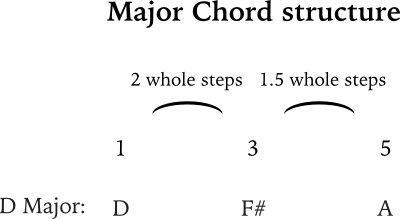
In contrast, minor triad chords contain the chord tones 1, b3, and 5. For example, a D minor chord would contain the chord tones D, F, and A. However, we will only be covering the different Major chord variations in this lesson.
Now that you know what notes belong to the chord structure let’s look at how to read the chord charts.
How to read the chord charts
For the charts below:
- The top horizontal line of the chord chart represents the high E string and the bottom horizontal line represents the low E string.
- The vertical lines separate each fret.
- The numbers in the blue dots tell you which fingers to use on the fretting hand.
- The letters on the right of the charts tell you what notes you are playing on each string.
- Circles on the left represent open strings.
- Red X means to avoid that string.
You can check this link for more on how to read guitar notation symbols.
D open chord
This is the first way I recommend learning a D Major chord. This is considered an open chord, meaning that there are open strings included in the shape.
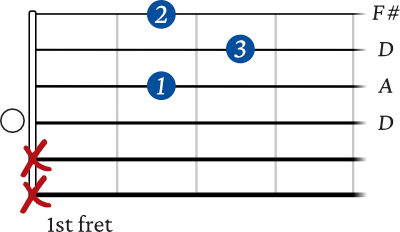
D Major triad
Another easy way you can play this chord is by using this triad shape with the open D string.
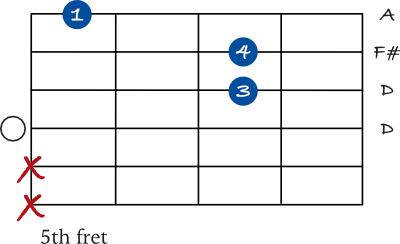
D Major chord 2nd inversion (D/A)
You can also add one more note to the previous shape by including your pinky. You can also think of this as D in 2nd inversion, meaning the 5th of the chord is in the bass note.
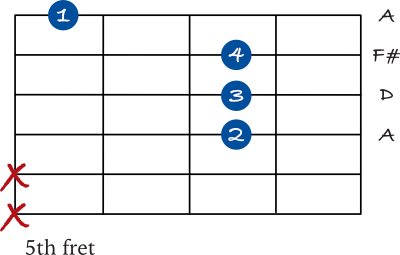
D Major on the 5th string (without barre)
For this shape, you have to make sure to not let the 1st string ring out. You can mute the 1st string letting the bottom part of your first finger lightly touch the string, but not press it down.
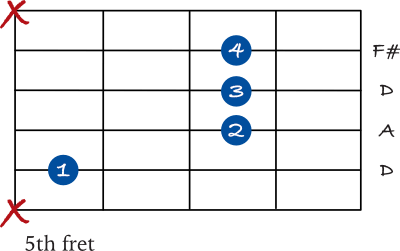
D Major chord barre on the 5th string
This is another common chord shape that will show up when looking up a D chord. This shape comes from the open A Major chord except you have to rearrange your fingers as you barre the 5th fret with your 1st finger.
*Tip: Before even trying this on the 5th fret, start the shape higher up on the fretboard around the 7th fret. The tension of the strings is lighter as you press down on chords higher up the fretboard. Then you can gradually shift the shape down as you develop more strength in your hand.
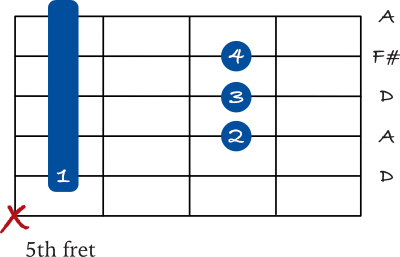
D Major variation 5th string
This is another chord variation you can use starting on the 5th string. This shape uses your pinky so if you’re not used to using it, it can feel awkward at first. This is very similar to an open C Major chord shape except you have to rearrange your fingers when you add your pinky (4th finger).
The shape looks like this:
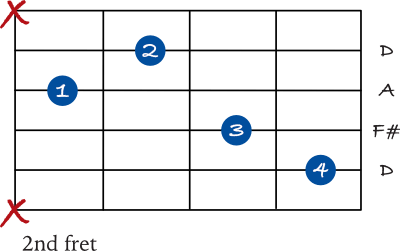
D chord variation with a mini barre
This is similar to the previous chord except you can use your first finger to barre the 1st string as well. It looks like this:
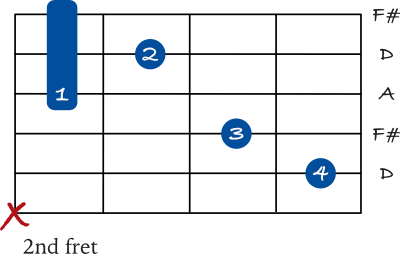
D Major 2nd inversion (5th string)
This chord can be called a D Major in 2nd inversion because the A note is in the bass. This makes the chord sound fuller compared to the last chord we looked at. You can play it like this:
You can also check out this other lesson for more on how to play chord inversions on the guitar.
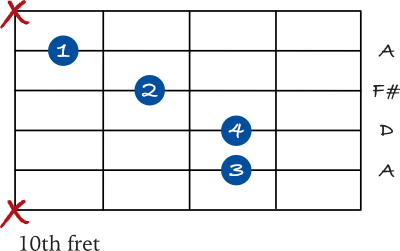
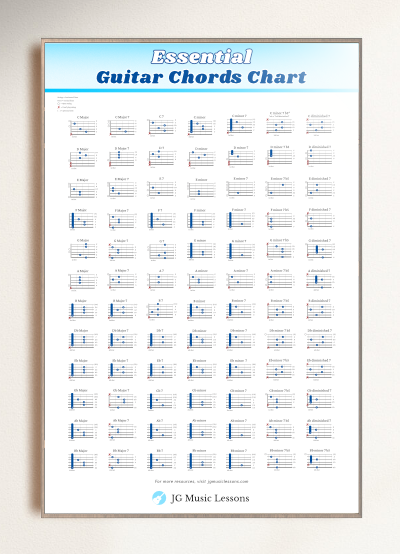
D Major mini barre
Another step you can take to make the D chord sound fuller is to play a mini barre on the 1st and 2nd strings. The mini barre can be hard at first but it will get easier as you continue to review this shape. The chord looks like this:
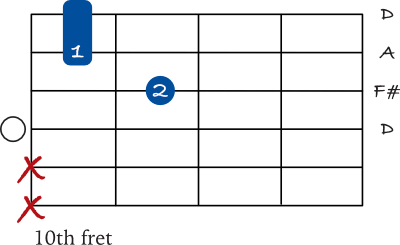
D Major chord 2nd inversion (mini barre)
This shape is similar to the previous chord except you add the A, which is the 5th degree in the bass. However, you have to rearrange some of your fingers like this:
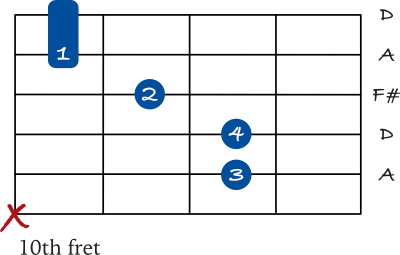
D Major barre chord on the 6th string
At this point, we’ve worked on different steps to take before getting to this chord because it requires more strength in your fretting hand.
This shape comes from the open E Major chord except you have to rearrange your fingers as you barre the 10th fret with your 1st finger.
Here is the chord:
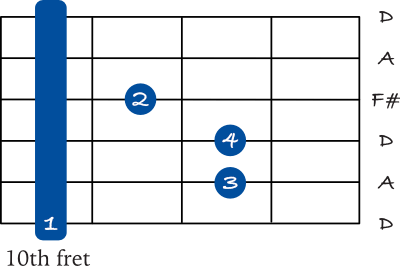
Tip* If this chord is difficult to play, start the shape higher up on the fretboard. The tension of the strings is lighter as you press down on chords higher up the fretboard. Then you can gradually shift the shape down as you develop more strength in your hand.
You may also want to check out 5 tips to get better at playing barre chords on guitar.
D Major chord spread shapes
The following chords are called spread shapes because of the wider space between some of the notes within the chord shape. Because these chord shapes skip a string, they are more suitable for a finger picking style of playing. You might also hear these chords in a more classical music context.
To go more in-depth, check out this lesson on how to play spread triad chords on the guitar.
D spread chord on the 6th string
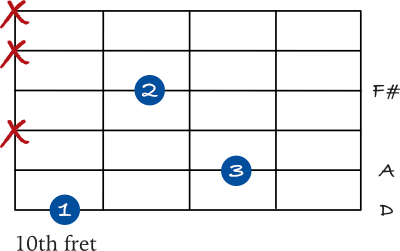
D spread chord on the 5th string
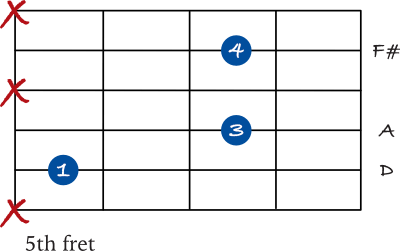
D spread chord on the 4th string
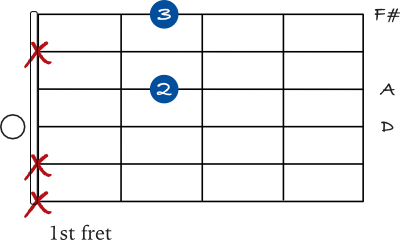
Wrapping up
All these chords were mostly in root position, meaning the root note is in the bass. However, you have even more variations if you use different chord inversions. This is when you play a chord with notes other than the root in the bass.
It’s good to know many possibilities of playing the same chord because you have more flexibility to move around the fretboard. Also, you can use different chord variations when you need a certain note at the top to help define a melody that you are playing over.
I hope this helped you understand how to play a D Major guitar chord or learn new ways of playing it. You can also try shifting the shapes that have all fretted notes to play other Major chords on the same string.
To learn more advanced chords, check out how to play a D Major 7 or D 7 chord on guitar.
📘 Get the free guitar practice guide here!
All the best,
JG Music Lessons
📙 Kickstart your guitar playing with our step by step guide: Guitar Essentials.
🎸 Looking for a travel or half-sized guitar? See this one.
🛠 See our other music recommendations.
🤝 Support the site to help us to create better content for you!
Level up with the FREE guitar practice guide and effectively improve your playing! 🎸
Get it sent to your email!

